- Home
- Haruki Murakami
First Person Singular Page 3
First Person Singular Read online
Page 3
“But you’re seeing him?”
“Um. He calls me whenever he wants my body,” she said. “Like ordering takeout over the phone.”
I had no clue how to respond, so I kept quiet. She traced a figure on my back with her fingertips. Or maybe she was writing something, in cursive.
“He told me that my face is plain but my body is the best.”
I didn’t think her face was particularly plain, though calling her beautiful was going too far. Looking back on it now, I can’t recall what kind of face she had, exactly, or describe it in any detail.
“But if he calls, you go?”
“I love him, so what else can I do?” she said, like nothing could be more natural. “No matter what he says to me, there are just times when I’m dying to have a man make love to me.”
I considered this. But back then it was beyond me to imagine what feelings this entailed—for a woman to want a man to make love to her. (And even now, come to think of it, I don’t entirely understand it.)
“Loving someone is like having a mental illness that’s not covered by health insurance,” she said, in a flat tone, like she was reciting something written on the wall.
“I see,” I said, moved by her words.
“So it’s okay if you think of some other woman instead of me,” she said. “Don’t you have anybody you like?”
“Yeah, I do.”
“So I don’t mind if you yell that person’s name when you come. It won’t bother me at all.”
There was a girl I liked at the time, but circumstances kept us from getting more deeply involved, and when the moment arrived, I didn’t call out her name. The thought crossed my mind, but in the middle of sex it seemed kind of stupid, and I ejaculated inside the woman without a word. She was about to yell a man’s name, like she said she would, and I had to hurriedly stuff the towel between her teeth. She had really strong, healthy-looking teeth. Any dentist would be properly impressed. I don’t even remember what name she yelled. All I recall is that it was some nothing, run-of-the-mill name, and that I was impressed that such a bland name was, for her, precious and important. A simple name can sometimes really jolt a person’s heart.
* * *
—
The next morning, I had an early class where I had to submit a major report in lieu of a midterm, but as you can imagine, I blew it off. (Which led to some huge problems later, but that’s another story.) We finally woke up in the late morning, and boiled water for instant coffee, and ate some toast. There were some eggs in the fridge, so I boiled them for us to eat. The sky was clear and cloudless, the morning sunlight dazzling, and I was feeling pretty lazy.
As she munched on buttered toast, she asked me what I was majoring in at college. I’m in the literature department, I said.
Do you want to be a novelist? she asked.
I’m not really planning to, I answered honestly. I had no plans whatsoever at the time of becoming a novelist. I’d never even considered it (though there were plenty of people in my class who’d announced that they were planning to become novelists). With this, she seemed to lose interest in me. Not that she had much interest to begin with. But still.
In the light of day, I could see that her teeth marks were imprinted on the towel, and it struck me as a little bizarre. She must have bitten down on it pretty hard. In the light of day, she seemed out of place. It was hard to believe that this girl—small, bony, with a not-so-great complexion—was the same girl who, the night before, had screamed out passionately in my arms, in the winter moonlight.
“I write tanka poems,” she said, out of the blue.
“Tanka?”
“You know tanka, right?”
“Sure,” I said. Even someone as naive as me knew that much. “But this is the first time I’ve met someone who actually writes them.”
She gave a happy laugh. “But there are people like that in the world, you know.”
“Are you in a poetry club or something?”
“No, it’s not like that,” she said. She gave a slight shrug. “Tanka are something you write by yourself. Right? It’s not like playing basketball.”
“What kind of tanka?”
“Do you want to hear some?”
I nodded.
“Really? You’re not just saying that?”
“Really,” I said.
And that was the truth. I was curious. I mean, what kind of poems would she write, this girl who, a few hours before, had moaned in my arms and yelled another man’s name?
She hesitated. “I don’t think I can recite any here. It’s embarrassing. And it’s still morning. But I did publish a kind of collection, so if you really want to read them, I’ll send it to you. Could you tell me your full name and address?”
I jotted down my address on a piece of memo paper and handed it to her. She glanced at it, folding it in four, then stuffed it in the pocket of her overcoat. A light green coat that had seen better days. On the rounded collar was a silver broach shaped like a lily of the valley. I remember how it glistened in the sunlight that was streaming in through the south-facing window. I know next to nothing about flowers, but for some reason I’ve always liked lilies of the valley.
“Thanks for letting me stay over. I truly didn’t want to ride back to Koganei on my own,” she said as she was leaving my place. “That happens with girls sometimes.”
We were both well aware of it then. That we would probably never see each other again. That night she simply didn’t want to ride the train all the way back to Koganei—that’s all there was to it.
* * *
—
A week later, her poetry collection arrived in the mail. Honestly, I really didn’t expect her to follow up and send it. I figured she’d totally forgotten about me by the time she got back to her place in Koganei (or perhaps she’d tried to forget me as soon as she could), and never imagined that she’d go to all the trouble to put a copy of the book in an envelope, write my name and address, stick on a stamp, and toss it in a mailbox—maybe even going all the way to the post office, for all I knew. So one morning, when I spied that package in my mail slot in the apartment, it took me by surprise.
The title of the poetry collection was On a Stone Pillow. The author was listed as Chiho. It wasn’t clear if this was her real name or a pen name. At the restaurant I must have heard her name many times, but I couldn’t recall it. No one called her Chiho, though, that much I knew. The collection was in a plain brown business envelope, with no name or return address, and no card or letter included. Just one copy of a thin poetry collection, bound together with white string, silently resting inside. It wasn’t some cheap mimeograph, but nicely printed on thick, high-quality paper. I’m guessing the author arranged the pages in order, attached the cardboard cover, and carefully hand-bound each copy using a needle and string to save on bookbinding costs. I tried imagining her doing that sort of work, but couldn’t picture it. The number 28 was stamped on the first page. Must have been the twenty-eighth in a limited edition. How many were there altogether? There was no price indicated anywhere. Maybe there never was a price.
I didn’t open the poetry collection right away. I left it on top of my desk, casting the occasional glance at the cover. It wasn’t that I wasn’t interested, it’s just I felt that reading a poetry collection someone put together—especially a person who, a week before, has been naked in my arms—required a bit of mental preparation. A sort of respect toward it, I suppose. Finally, that weekend, in the evening, I opened the book. I leaned back against the wall next to the window and read it in the winter twilight. There were forty-two poems contained in the collection. One tanka per page. Not a particularly large number. There was no foreword, no afterword, not even a date of publication. Just printed tanka in straightforward black type on white pages with generous margins.
I certainly
wasn’t expecting some monumental literary work or anything. Like I said, I was simply curious. What kind of poems would come from a woman who yelled some guy’s name in my ear as she bit on a towel? What I found as I read through the collection was that several of the poems really got to me.
Tanka were basically a mystery to me (and still are, even now). So I’m certainly not able to venture an objective opinion about which tanka are considered great, and which ones not so much. But apart from any judgments of literary value, several of the tanka she wrote—eight of them, specifically—struck a chord deep within me.
This one, for instance:
The present moment
if it is the present moment
can only be taken
as the inescapable present
In the mountain wind
a head cut off
without a word
June water at the roots of
a hydrangea
Strangely enough, as I opened the pages of the poetry collection, following the large, black printed words with my eyes and reading them aloud, the girl’s body I saw that night came back to my mind, exactly as it was. Not the less-than-impressive figure I saw in the morning light, but the way she was as I held her body, enveloped by smooth skin, in that moonlit night. Her shapely round breasts, the small hard nipples, the sparse pubic hair, her wet vagina. As she reached orgasm, she shut her eyes, bit down hard on the towel, and called out, again and again, another man’s name in my ear. The name of a man somewhere, a plain name I can’t even recall.
As I consider that
we’ll never meet again
I also consider how
there’s no reason that we cannot
Will we meet
or will it simply end like this
drawn by the light
trampled by shadows
I have no idea, of course, whether she’s still writing tanka or not. As I said, I don’t even know her name, and hardly remember her face at all. What I do remember is the name Chiho on the cover of the collection, her defenseless, supple flesh in the pale winter moonlight shining through the window, and the mini-constellation of two small moles beside her nose.
Perhaps she’s not even alive anymore. Sometimes I think that. I can’t help but feel that maybe at some point she took her own life. I say this because most of her tanka—or at least most of the ones in that collection—depicted images of death. And for some reason these involved a head being severed with a blade. For her, that style might have been her own way of dying.
Lost in this incessant
afternoon downpour
a nameless ax
decapitates the twilight
But in a corner of my heart, I’m still wishing she’s alive somewhere in this world. Sometimes I’ll catch myself, all of sudden, hoping that she’s survived, that she’s still composing poetry. Why? Why do I take the trouble to think about something like that? There’s not one thing that connects my life and hers. Even if, say, we passed each other on a street, or were seated at adjoining tables in a restaurant, I seriously doubt that we would even recognize each other. Like two straight lines overlapping, we momentarily crossed at a certain point, then went our separate ways.
Many years have passed since then. Strangely enough (or perhaps not so strangely), people age in the blink of an eye. Each and every moment, our bodies are on a one-way journey to collapse and deterioration, unable to turn back the clock. I close my eyes, I open them again, only to realize that in the interim so many things have vanished. Buffeted by the intense midnight winds, these things—some with names, some without—disappear without a trace. All that is left is a faint memory. Even memory, though, can hardly be relied on. Can anyone say for certain what really happened to us back then?
If we’re blessed, though, a few words might remain by our side. They climb to the top of the hill during the night, crawl into small holes dug to fit the shape of their bodies, stay quite still, and let the stormy winds of time blow past. The dawn finally breaks, the wild wind subsides, and the surviving words quietly peek out from the surface. For the most part they have small voices—they are shy and only have ambiguous ways of expressing themselves. Even so, they are ready to serve as witnesses. As honest, fair witnesses. But in order to create those enduring, long-suffering words, or else to find them and leave them behind, you must sacrifice, unconditionally, your own body, your very own heart. You have to lay down your neck on a cold stone pillow illuminated by the winter moon.
Aside from me, maybe there’s not another soul in this world who remembers that girl’s poems, let alone someone who can recite them. With the exception of number 28, that slim little self-published book, bound together with string, is now forgotten, dispersed, sucked up somewhere into the benighted darkness between Jupiter and Saturn, vanished forever. Perhaps she herself (assuming she’s still alive) can’t recall a thing about those poems she wrote back when she was young. Maybe the only reason I recall some of her poetry even now is because it’s linked to memories of her teeth marks on that towel. Maybe that’s all it is. I don’t know how much meaning or value there is in still remembering all that, in sometimes pulling out that faded copy of the poetry collection from my drawer and reading it again. To tell the truth, I really don’t know.
At any rate, those remained. While other words and memories turned to dust and vanished.
Whether you cut it off
or someone else cuts it off
if you put your neck on the stone pillow
believe it—you will turn to dust
CHARLIE PARKER PLAYS BOSSA NOVA
Bird is back.
How fantastic that sounds! Yes indeed, the Bird you know and love has returned, his powerful wings beating the air. In every corner of this planet—from Novosibirsk to Timbuktu—people are going to gaze up in the sky, spy the shadow of that magnificent bird, and cheer. And the world will be filled once more with brilliant sunlight.
The time is 1963. Years since people last heard the name Charlie “Bird” Parker. Where is Bird, and what is he up to? Jazz lovers around the world whispered these questions. He can’t be dead yet, can he? Because we never heard of him passing away. But you know, someone would say, I haven’t heard anything about him still being alive, either.
The last news anyone had heard about Bird was that his patron, Baroness Nica, took him into her mansion, where he battled various ailments. Jazz fans are well aware of Bird’s struggles as a junkie. Heroin—that deadly, pure white powder. Rumor had it that on top of his addiction he struggled with acute pneumonia, a variety of internal maladies, the symptoms of diabetes, and ultimately mental illness. Even if he was fortunate enough to survive all these, people thought, he would be so infirmed that he’d never pick up his instrument again. That’s how Bird vanished from sight, transforming into a beautiful jazz legend. Around the year 1955.
Fast-forward to the summer of 1963. Charlie Parker picked up his alto sax again to record an album in a recording studio outside of New York. And that album’s title is Charlie Parker Plays Bossa Nova!
Can you believe it?
You’d better. Because it happened.
It really did.
* * *
—
This was the opening of a piece I wrote back in college. It was the first time anything I wrote got published, and the first time I got paid a fee for something I’d written, even if it was a pittance.
Naturally, there’s no such record titled Charlie Parker Plays Bossa Nova. Charlie Parker passed away on March 12, 1955, and it wasn’t until 1962 that bossa nova broke through, spurred on by performances by Stan Getz and others. But if Bird had survived until the 1960s, and if he got interested in bossa nova, and had performed it…That was the setup for the review I wrote about this imaginary record.
The editor of the university li
terary journal that published this piece never doubted that it was an actual album, and published the essay in the magazine as an ordinary piece of music criticism. The editor’s younger brother, a friend of mine, sold him on me, telling him I wrote some good stuff and they should use my work. (This magazine folded after four issues. My piece was in issue number 3.)
A precious recording tape that Charlie Parker left behind was discovered by accident in the vaults of a record company and just recently saw the light of day—that was the premise I cooked up for the article. Maybe I shouldn’t say this myself, but I think this made-up story was plausible: the details were strong, and the writing had real punch. So much so that in the end I nearly came to believe that record existed.
There was considerable reaction to my article when the magazine published it. This was a low-key little college literary journal, generally ignored by readers. But there seemed to be quite a few fans who still idolized Charlie Parker, and the editor received a couple of letters complaining about my moronic joke and thoughtless sacrilege. Do other people lack a sense of humor? Or is my sense of humor kind of twisted? Hard to say. Some people apparently took the article at face value and even went to music stores in search of the record.
The editor did kick up a bit of a fuss about my having tricked him. I didn’t actually fool him, but merely omitted a detailed explanation. Inwardly he must have been pleased that the article drew such a reaction, though most of it was negative. Proof of his enthusiasm came when he told me he’d like to see whatever else I wrote, criticism or original work. (The magazine disappeared before I could show him another piece.)
My article went on as follows:
…Who would have ever imagined an unusual lineup like this—Charlie Parker and Antonio Carlos Jobim joining forces? Jimmy Raney on guitar, Jobim on piano, Jimmy Garrison on bass, Roy Haynes on drums—a dream rhythm section so amazing that it makes your heart pound just hearing the names. And on alto sax—who else but Charlie “Bird” Parker.

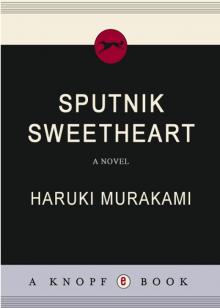 Sputnik Sweetheart
Sputnik Sweetheart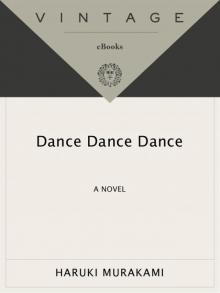 Dance Dance Dance
Dance Dance Dance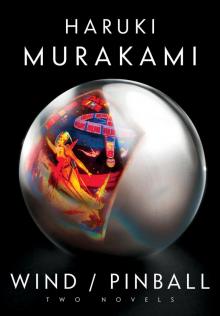 The Wind (1) and Up Bird Chronicle (2)
The Wind (1) and Up Bird Chronicle (2)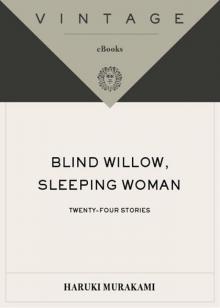 Blind Willow, Sleeping Woman
Blind Willow, Sleeping Woman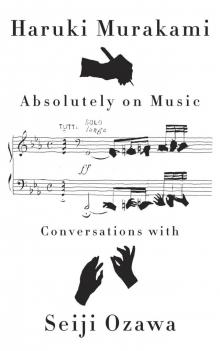 Absolutely on Music: Conversations With Seiji Ozawa
Absolutely on Music: Conversations With Seiji Ozawa Norwegian Wood
Norwegian Wood South of the Border, West of the Sun
South of the Border, West of the Sun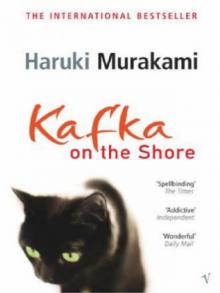 Kafka on the Shore
Kafka on the Shore Men Without Women
Men Without Women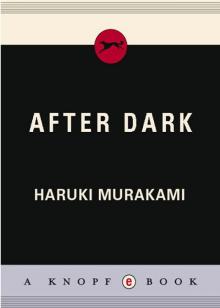 After Dark
After Dark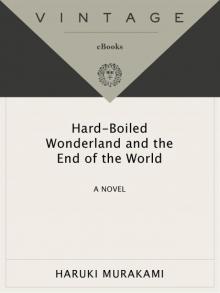 Hard-Boiled Wonderland and the End of the World
Hard-Boiled Wonderland and the End of the World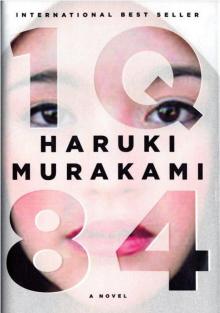 1q84
1q84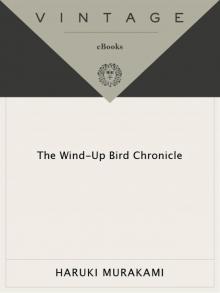 The Wind-Up Bird Chronicle
The Wind-Up Bird Chronicle Underground: The Tokyo Gas Attack and the Japanese Psyche
Underground: The Tokyo Gas Attack and the Japanese Psyche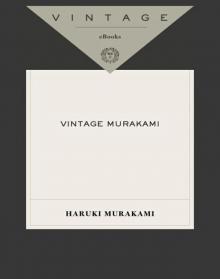 Vintage Murakami
Vintage Murakami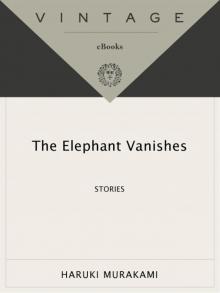 The Elephant Vanishes: Stories
The Elephant Vanishes: Stories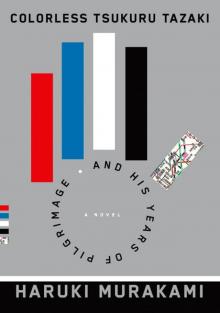 Colorless Tsukuru Tazaki and His Years of Pilgrimage
Colorless Tsukuru Tazaki and His Years of Pilgrimage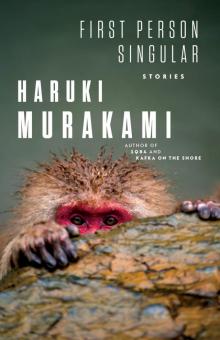 First Person Singular
First Person Singular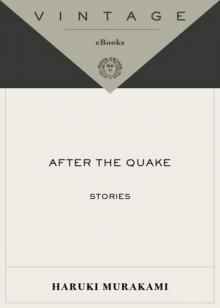 After the Quake
After the Quake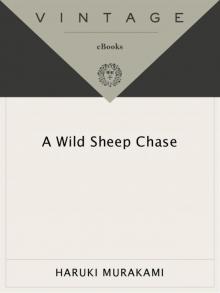 A Wild Sheep Chase
A Wild Sheep Chase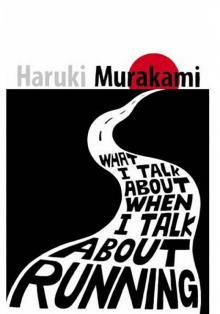 What I Talk About When I Talk About Running
What I Talk About When I Talk About Running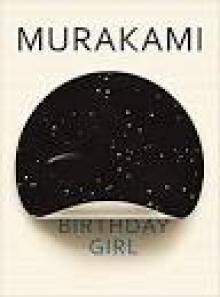 Birthday Girl
Birthday Girl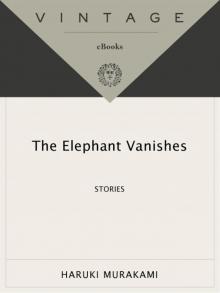 The Elephant Vanishes
The Elephant Vanishes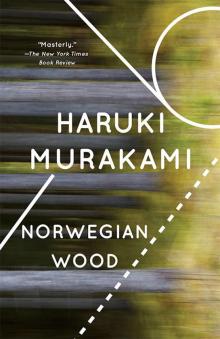 Norwegian Wood (Vintage International)
Norwegian Wood (Vintage International)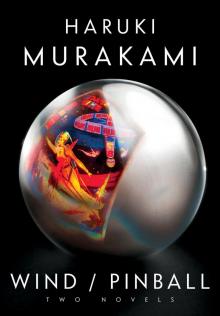 Wind/Pinball
Wind/Pinball Norwegian Wood Vol 1.
Norwegian Wood Vol 1. Underground
Underground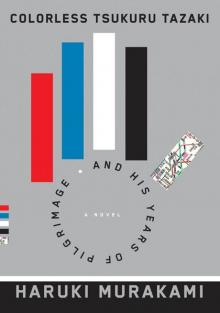 Colorless Tsukuru Tazaki and His Years of Pilgrimage: A novel
Colorless Tsukuru Tazaki and His Years of Pilgrimage: A novel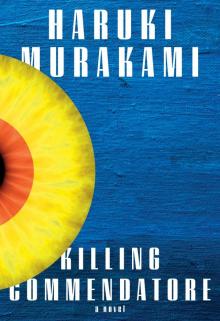 Killing Commendatore
Killing Commendatore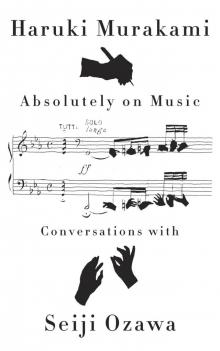 Absolutely on Music
Absolutely on Music